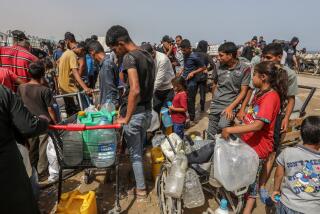U.S. announces unilateral Iran sanctions
Reporting from Washington — The Obama administration Wednesday added several dozen Iranian individuals and organizations to its sanctions blacklist, its first steps to intensify pressure after new international sanctions were adopted last week by the United Nations Security Council.
The penalties are aimed at entities tied to Iran’s nuclear and missile program, including a bank, numerous front companies and energy and insurance concerns, and two individuals and several groups tied to the Iranian Revolutionary Guard Corps.
The move is important primarily for its symbolic significance: It is intended to signal to other countries that the United States will build vigorously on the U.N. sanctions, and wants other countries to do the same.
Treasury Secretary Timothy Geithner, announcing the sanctions at the White House, said that to be effective “we need to have in place a concerted international approach. This is not something the United States can do alone.”
A number of countries and blocs are expected to soon impose similar penalties in an effort to intensify the effect of the U.N. sanctions, which by themselves have limited power. The European Union, for example, is expected to announce a palette of sanctions Thursday.
But Russia and China have indicated that they oppose further sanctions on Iran’s economy or trade. The Russian Foreign Ministry last week warned against unilateral sanctions that punish foreign companies.
The United States and many other countries allege Iran’s nuclear program is intended to acquire nuclear weapons know-how. Iran insists its purposes are peaceful.
The U.S. sanctions blacklist is intended to frighten international business from Iran, thus increasing its economic and political isolation. U.S. companies that conduct business with foreign companies that do business with the listed companies are subject to U.S. penalties.
Previous U.S. sanctions, and three past rounds of U.N. sanctions, have not succeeded in persuading Iran to end its nuclear program, which it says it has a right to as a signatory of the Nuclear Non-Proliferation Treaty. But Iran is sensitive to international efforts at punishment, and worked hard to try to avoid last week’s U.N. sanctions.
Iran showed its sensitivity Wednesday, as President Mahmoud Ahmadinejad vowed in Tehran to punish the West and force it to “sit at the negotiating table like a polite child” before beginning talks. Ahmadinejad said his country would build four new nuclear reactors.
Iranians “do place high value on their international legitimacy and their place in the world,” said Ivan Oelrich of the Federation of American Scientists. “So the sanctions do have a moral effect.”
The U.S. list includes Post Bank, the 16th Iranian bank to be targeted. It a;sp includes 90 ship names that Iran’s international shipping company has allegedly been using to evade sanctions.
Seventeen of the 22 energy and insurance companies added to the list operate outside Iran.
U.S. officials said the government had authority to sanction the individuals and groups before the U.N. Security Council resolution.
But Stuart Levey, the Treasury Department official in charge of the sanctions effort, told reporters that the Obama administration wanted to wait until the international community had spoken.
Officials acknowledged that the Iranians are by now experienced in working around the blacklists and establishing front companies. The newly sanctioned Post Bank was used to finance weapons transactions after another institution, Bank Sepah, was hamstrung by previous sanctions.
“We know that officials in Iran have been anxious about the sanctions,” Levey said. “They will scramble to find work-arounds.”
But though the Iranians can rename ships and change banks, “work-arounds can be time-consuming and very expensive,” said Robert Einhorn, the State Department’s special advisor for nonproliferation and arms control.
Einhorn, a veteran counter-proliferation official, has been assigned the job of lobbying other countries to adhere to the sanctions.
Officials said the blacklisting process works because international business recoils from any association with Iran.
As the blacklist expands “the private sector will step in and go further than what is required,” Levey said.
More to Read
Sign up for Essential California
The most important California stories and recommendations in your inbox every morning.
You may occasionally receive promotional content from the Los Angeles Times.












